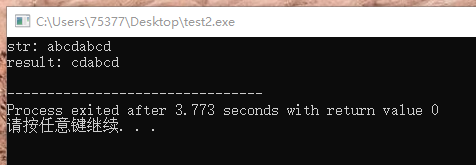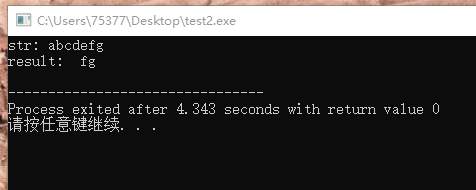1、
#include <stdio.h> char *str_chr(char *x, int key) { while(*x) { if(*x == key) { char *t = x; return t; } x++; } return NULL; } int main(void) { char str[128]; printf("str: "); scanf("%s", str); printf("result: %s ", str_chr(str, 'c')); return 0; }

2、
#include <stdio.h> #include <string.h> char *str_c(char *x, int key) { int i, len = strlen(x); for(i = 0; i < len; i++) { if(*x++ == key) { char *t = x - 1; return t; } } return NULL; } int main(void) { char str[128]; printf("str: "); scanf("%s", str); printf("result: %s ", str_c(str, 'd')); return 0; }

3、
#include <stdio.h> char *str_cho(char *x, int key) { char *t; int j = 0; while(*x) { if(*x == key) { t = x; j++; break; } x++; } if(j == 0) t = NULL; return t; } int main(void) { char str[128]; printf("str: "); scanf("%s", str); printf("result: %s ", str_cho(str, 'e')); return 0; }

4、
#include <stdio.h> char *str_ch(char *x, int key) { char *t; while(*x) { if(*x == key) { t = x; break; } else t = NULL; x++; } return t; } int main(void) { char str[128]; printf("str: "); scanf("%s", str); printf("result: %s ", str_ch(str, 'f')); return 0; }
